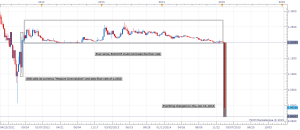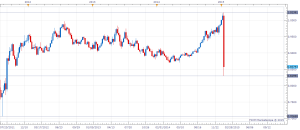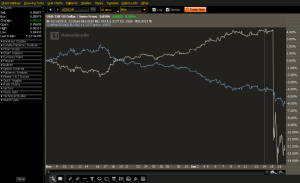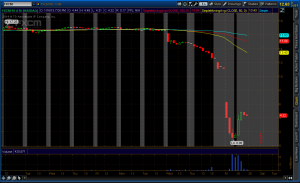During the week of February 16, 2015, BoE (Bank of England), FOMC (Federal Open Market Committee) and ECB (European Central Bank) released its meeting minutes for the latest monetary decisions. Let’s go in depth of these meeting minutes and how we can apply them to our trading decisions.
Bank of England (BoE) – (February 18, 2015)
The Bank of England meeting minutes showed that the Monetary Policy Committee (MPC) voted unanimously (9 members) to keep the benchmark interest rate unchanged at a record-low of 0.5%. There were hints it could be lowered in the next few months (yes, decrease, not increase). Two committee members, Martin Weale and Ian McCafferty who voted in favor of rate hike previously, were in favor in holding rates this time. Regarding its inflation in which Consumer Prices Index (CPI) fell to 0.3% (lowest since decades ago) last month changed the views of MPC. Some worry that it might slip below zero in the next few months. It has caused some to suggest rate cut over the next few months. The rate cut hinted in the minutes is totally different than what the Bank of England governor, Mark Carney said last week.
Mark Carney spoke to the press at Inflation Report press conference. He signaled that BoE remains on course to raise interest rates in the U.K. next year, despite decline in inflation. He also mentioned that BoE might cut the interest rate if inflation transforms into deflation (below 0). I believe if the inflation falls below 0, the BoE will cut the interest rate by 0.25, but only for short period of time. However, he pointed out that BoE still expects its next move will be raising rates, not cut them.
There are confusions going on with BoE on interest rate. I look at this way; inflation goes below 0, rate cut will come, inflation starts to increase, rate increase will come, and watch out for future statements by BoE for more clues. I would not trade Pound (GBP) based on these interest rate talks, for now. There is no clear road for interest rate for now. But, I would trade based on other news/events and charts’ technical.
Federal Reserve – (February 18, 2015)
The Federal Reserve meeting minutes showed that the Federal Open Market Committee (FOMC) expressed concerns over raising interest rates too soon, which could could halt or slow the U.S economic “recovery”. They are also worried over the impact of dropping “patient” from central bank’s rate guidance. They thought that removing “patient” from the FOMC statements in the future would put too much weight on its meaning. As a result, it would cause financial markets to overreact (Unlike Swiss National Bank, Federal Reserve cares about financial markets movements). If “patient” is dropped, I would think that interest rate hike is coming in the next two meetings. They also worried about falling inflation expectations in the U.S. If the inflation drops, I believe it’s going to halt (not cut) FOMC from raising the interest rate, but not decrease the rates.
In the minutes, it’s mentioned that there are worries about international events such as Greece (Greece got 4 month bailout) and Ukraine (There’s no “truce”). But, it’s not going to keep them from raising the interest rate, backed by strong jobs reports. However, the federal reserve signaled its willingness to keep interest rates low for longer because of strong U.S dollar and “flat” housing market. Raising interest rates will only send U.S higher, making it much stronger than ever.
On February 24 and 25, Fed Chair Janet Yellen will be speaking in congressional testimony and we should look for further clues to the timing of the interest rate hike.
Any clues of earlier rate hike will send U.S. dollar to rise in which I would go short USD/JPY, USD/CAD, and/or long GBP/USD. Remember, don’t hold your trade positions for more time if you trigger market order just based on what Yellen said, unless there are other news and technical to support your trade.
European Central Bank (ECB) – (February 19, 2015)
The European Central Bank first ever meeting minutes showed fears of continued deflation the euro zone, which led to launch of Quantitative Easing (QE) program which starts in March. The main goal of QE is to drag the euro zone out of deflation and near to 2% inflation target. This first minutes doesn’t reveal much of anything. Since there weren’t any new details or “surprising” details, the markets, especially Euro did not move much.
Europe has agreed to extend its financial lifeline to Greece only for 4 months. The deal was stuck last Friday (February 20, 2015). This is another bailout for Greece. How long does Euro has to keep bailing out Greece from the mess Greece made? The deal is not final if Greece does not come up with its plan by Monday (February 23, 2015). Then, it will be voted by institutions involved in the bailout by April. If the institutions do not back the plan, the “deal” becomes “no deal”.
I would still keep an eye on Greece. If you trade Euro, be careful with news coming out of Greece. It will be violent and may cause you to have losing positions or touch stop loss (or make money). When picking Euro to trade, I would pick pairs other than EUR/USD.
If you have any questions, feel free to leave comments or contact. Thank you.





